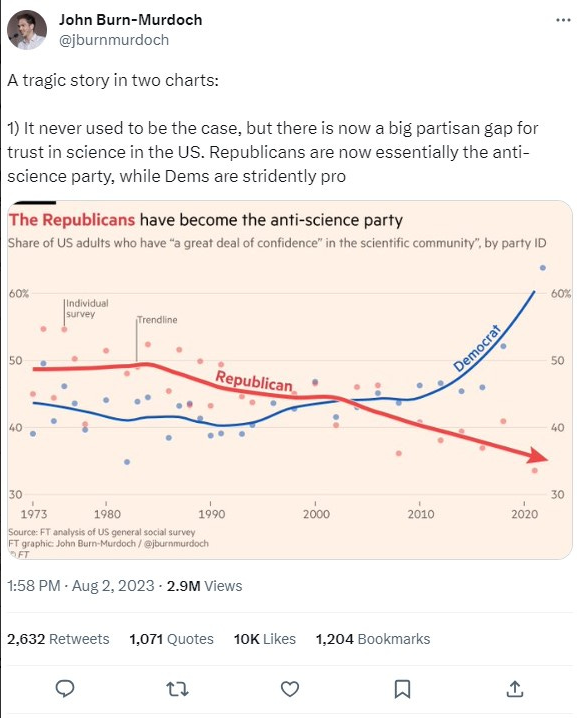Given the way “the science” has been politicized over recent years and especially through the pandemic, it’s almost a surprise that there’s any residual public trust left for the scientific community:
Sagan’s warning was eerily prophetic. For the last three-plus years, we’ve witnessed a troubling rise of authoritarianism masquerading as science, which has resulted in a collapse in trust of public health.
This collapse has been part of a broader and more partisan shift in Americans who say they have “a high degree of confidence in the scientific community”. Democrats, who had long had less confidence in the scientific community, are now far less skeptical. Republicans, who historically had much higher levels of trust in the scientific community, have experienced a collapse in trust in the scientific community.
John Burn-Murdoch, a data reporter at The Financial Times who shared the data in question on Twitter, said Republicans are now “essentially the anti-science party”.
First, this is a sloppy inference from a journalist. Burn-Murdoch’s poll isn’t asking respondents if they trust science. It’s asking if they trust the scientific community. There’s an enormous difference between the two, and the fact that a journalist doesn’t understand the difference between “confidence in science” and “confidence in the scientific community” is a little frightening.
Second, as Dr. Vinay Prasad pointed out, no party has a monopoly on science; but it’s clear that many of the policies the “pro science” party were advocating the last three years were not rooted in science.
“The ‘pro science’ party was pro school closure, masking a 26 month old child with a cloth mask, and mandating an mrna booster in a healthy college man who had COVID already,” tweeted Prasad, a physician at the University of California, San Francisco.
Today we can admit such policies were flawed, non-sensical or both, as were so many of the mitigations that were taken and mandated during the Covid-19 pandemic. But many forget that during the pandemic it was verboten to even question such policies.
People were banned, suspended, and censored by social media platforms at the behest of federal agencies. “The Science” had become a set of dogmas that could not be questioned. No less an authority than Dr. Fauci said that criticizing his policies was akin to “criticizing science, because I represent science”.
This could not be more wrong. Science can help us understand the natural world, but there are no “oughts” in science, the economist Ludwig von Mises pointed out, echoing the argument of philosopher David Hume.
“Science is competent to establish what is,” Mises wrote. “[Science] can never dictate what ought to be and what ends people should aim at.”




